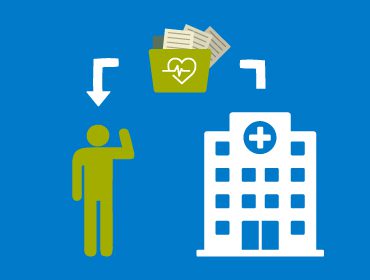
Our company recently conducted a survey of over 1,000 Americans about their moving habits and the impact it has on their healthcare and medical records. The results also show some gaps in what patients would like in terms of medical record access versus what they currently have.
More than 80% of Americans surveyed report that having access to their complete health record is important or very important.
While 648 (63%) of those surveyed report they do not have their medical history and vaccination records since birth, 670 (65%) are confident that they know where to find their records. This is interesting as 81% say that having access to their complete up-to-date health record is either important or very important to managing their overall health.
Perhaps this increased interest in having access to their records is partly due to the uptick in the electronic availability of medical records. In a national survey by the PEW Charitable Trusts, about half of all respondents had accessed their digital personal health record. Healthcare IT plays an important role in increasing interoperability (record sharing) between providers and patients. There are many initiatives underway for providers to meet the requirements of the 21st Century Cures Act. However, when patients move or have complicated medical histories, there can be extra challenges to keeping the information accurate, up to date and accessible.
Two challenges for patients in maintaining a lifelong medical record:
- Chronic conditions add complexity to care coordination and support the priority for long-term record management. With six in ten adults in the country currently battling a chronic illness that requires long-term and ongoing medical attention for conditions like diabetes, stroke, cancer, depression, anxiety and cardiovascular disease, maintaining accurate records that are shared between all care providers and with the patient is critical. Chronic disease has a substantial effect on the U.S. health system with about 90% of the annual $4.5 trillion health care expenditure attributed to managing and treating chronic diseases and mental health conditions. Care coordination is vital with patients often needing care from multiple providers and clinics. As such, access to the comprehensive medical record for clinicians and patients can support chronic disease management.
- Number of times the patient moves. According to the S. Census Bureau, the average American moves 11.7 times throughout their lifetime, with two or three of those times happening after age 45. With every move, the patient has a responsibility to communicate with their current and new healthcare providers to facilitate a smooth transfer of their medical records. Patients are advised to check with their new provider for their preferred record transfer process which may include getting a hard copy file in a CD or flash drive, or requesting the current provider digitally transfer the records. There are new HIPAA amendments in 2024 that restrict the right of individuals to transfer their ePHI to a third party, limiting this right only to ePHI maintained in an electronic health record (EHR) system. This is meant to provide a better balance between patient accessibility and data security.
Patient access to their long-term records and transferring records between providers is mostly a smooth process.
The healthcare industry continues to make strides toward better interoperability of medical records between providers, payers, and patients. Of those patients we surveyed, more than 70% reported they have not experienced any difficulties transferring records between healthcare providers or when switching doctors or specialists. Similarly, more than 70% reported they have not had any difficulty in accessing their records from a healthcare provider.
However, over time, electronic health record (EHR) systems are replaced, and legacy data interoperability is important as retention requirements can span decades.
What are the options for healthcare providers to maintain the complete medical record to meet patient needs and comply with regulatory requirements?
When there is a need to preserve and protect medical, business, and financial records, there is a one-stop solution to meet each organization’s individual needs.
Long-term access to records is enabled with Harmony Healthcare IT’s HealthData Platform™, a secure infrastructure that provides cloud-hosted accessibility to patient, employee, and business records for healthcare delivery organizations. This is important because over time as EHRs are replaced, records must be retained to meet clinical, legal, and business requirements. This solution supports storage, workflows, transactions, and interoperability to help IT, HIM, legal and business teams continue to function. There are many options for record storage within the Platform that all work together to keep records secure and accessible long term.
As decisions are made to decommission a legacy system, structured and unstructured data is either extracted and converted to a go-forward system (i.e., Epic, Cerner, MEDITECH) or migrated and secured into an active archive solution such as HealthData Archiver®.
HealthData Archiver® is an application that stores records of any type and provides on-demand access via a user interface with intelligent workflows (i.e., release of information for HIM users or Single Sign-On for clinicians as integrated on Epic’s Showroom and marketplaces for other leading EHRs).
Does your organization have records still residing in legacy applications, and looking for the best options for retention and sharing?
If patients move more than 11 times during their lifetime, healthcare providers also need to get moving to ensure their lifecycle data management plans are set for the long haul.
Our team can help you meet your cost, security, and interoperability goals.






